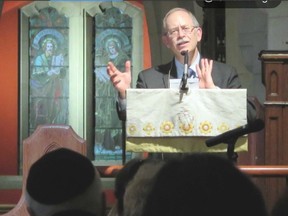The Jewish people have faced destruction and death in the past. We embody great resilience and much hope.

Article content
This year, in the midst of the war against Hamas, my wife and I became citizens of Israel. The timing and rationale for our decision lie in two anniversaries this month and in two scriptural readings chanted in synagogues in early May.
May 2, 1860 was the birthdate of Theodor Herzl, the spiritual father of political Zionism. An Austro-Hungarian journalist and activist, Herzl reached the conclusion that the persistence of antisemitism made Jewish integration into European society impossible. He came to believe that the only solution for Jews was the establishment of a Jewish state.
Advertisement 2
Article content
Article content
In 1896, Herzl wrote a pamphlet about his dream of a Jewish homeland. One year later, he convened the first Zionist Congress in Switzerland and formed an organization to promote immigration to what was then called Palestine. Herzl died in 1904, 44 years before his dream became reality.
In addition to the Jews who already lived in the land of Israel, others returned to their aboriginal land from Europe and North Africa, Arabia and Asia, Australia and the Americas. The vision of modern Zionism drew from the Biblical dream read two Saturdays ago: “I will restore my people Israel. They shall plant vineyards and drink their wine. They shall till gardens and eat their fruits. And I will plant them upon their soil, nevermore to be uprooted. Thus says the Eternal.” (Amos 9:14-15)
Israel, which marks its anniversary May 14, was intended to be that place of security. Particularly after the Holocaust. Another anniversary links these two epochal events.
The Hebrew month of Iyar began Thursday. On that day in spring 1961, Gideon Hausner began the trial of Adolf Eichmann with these words: “When I stand before you to lead the Prosecution, I am not standing alone. With me are six million prosecutors, but they cannot rise to their feet. They cannot point an accusing finger towards the one who sits in the dock. They cannot cry: I accuse. Their ashes are piled up on the hills of Auschwitz and the fields of Treblinka and are strewn in the forests of Poland. Their graves are scattered throughout the length and breadth of Europe. Their blood cries, but their voice is not heard. Therefore I will be their spokesman and in their name unfold this awesome indictment.”
Advertisement 3
Article content
The Eichmann Trial changed the way Israelis thought of the Shoah. As Natan Alterman, then editor of the newspaper DAVAR, wrote, “We now see things differently … We were ashamed of the Holocaust as one is ashamed of a terrible blatant defect … Now we know the (forms of resistance), the pity and the help, the Hebrew and arithmetic notebooks on the verge of a grave, the light of prayer, the hand on a shoulder, lips on a forehead, the farewell of lovers. The words said after all hope was lost.”
The Torah selection began with the words, “After the death of the sons of Aaron” and the State of Israel was supposed to ensure that “after the death” of many sons and daughters of the Jewish people, there would be security.
Last Oct. 7, that confidence was shattered. The intentional brutality of Hamas, the use of sexual violence as a terrorist weapon, the kidnapping of civilians and holding hostages underground in Gaza, and the displacement of 130,000 Israelis from their homes has led to a wholesale reappraisal of safety in Israel.
The demonstrations against Israel as immoral and illegitimate and the subsequent attacks against Jews in Europe, America and Canada have undermined Jewish security in western countries. Jews ask: Do we still have a place in France and England? Is there still a place for us in America and Canada? Was Herzl’s conclusion about the persistence of antisemitism correct?
Advertisement 4
Article content
It is too early to determine what “after the deaths”’ of Oct. 7 will mean for the future. The Jewish people have faced destruction and death in the past. We embody great resilience and much hope. We have seen elements of that inner strength in Israel civilian life and among proud Jews in Canada. Since the October attacks, almost 13,000 people have become Israeli citizens. After death, there is life.
In 2019, following the attack on a synagogue in Poway, Calif., a rabbi wrote: “I am going to be even more proud about walking down the street … And I’m going to use my voice … to urge my fellow Jews to do Jewish. To light candles before Shabbat. To put up mezuzas on their doorposts. To do acts of kindness … and to show up in synagogue.”
My wife and I remain proud citizens of Canada, the United States, and Israel. We choose to embrace life.
Baruch Frydman-Kohl is rabbi-in-residence at Kehillat Beth Israel Ottawa, and rabbi emeritus of Beth Tzedec Congregation, Toronto.
Recommended from Editorial
Article content




